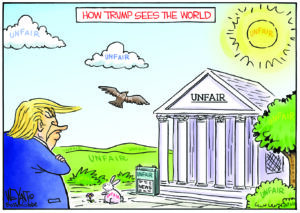Live Chat: Robert Scheer on the Economy
If you missed Robert Scheer discussing with readers his latest column, "The Rubin Con Goes On," on the WikiLeaks revelations, or you just want to relive the excitement, you can read the full transcript here.
BLANKIf you missed Robert Scheer discussing with readers his latest column, “The Rubin Con Goes On,” on the WikiLeaks revelations, or you just want to relive the excitement, you can read the full transcript or listen to the podcast below.
Subscribe to Truthdig Podcasts
If you don’t have iTunes,
copy this address:
Visit the Podcast Archives
Part 1:
Part 2:
Part 3:
9:52 Truthdig
Thu, 12 Aug 2010 17:52:27 GMT
Comment:
| The event doesn’t begin until 11 am PT / 2 pm ET but feel free to submit questions, we’ll accumulate them for when Robert Scheer arrives. |
11:02 Robert Scheer
Thu, 12 Aug 2010 19:02:59 GMT
Comment:
| Hello everyone. |
11:05 Truthdig
Thu, 12 Aug 2010 19:05:09 GMT
Comment:
| Question from knk18, Lake Forest. Why is Obama sticking with this team of Rubin, Summers and Geitner? He can’t be oblivious to their prior shenanigans. Does he think because they helped cause the mess that they are needed to fix it? |
11:10 Robert Scheer
Thu, 12 Aug 2010 19:10:17 GMT
Comment:
| Well, I think that Obama is kind of a deliberate centrist and a child of the meritocracy, and the assumption [is] that there is the best and the brightest centered at Harvard. And Summers, and Geithner — It’s a mystery why you’d go with guys who are screwing up royally as we speak. The most recent Wall Street Journal poll shows that the public is very down on this economic team, and over 70% of the American public thinks that this situation is going to get worse before it gets better. This is turning out to be the bane of Obama’s presidency. You’d have to ask a psychiatrist why he is sticking with a team that’s proving to be disastrous. The compelling argument that’s used to get people to sell out to Wall Street is [the danger] that they’ll “spook” the markets. They won’t invest, won’t lend money, things will get worse, and that has been the sellout mantra that causes politicians to cave to all people, and I think it’s not true. You have to confront them; they require regulation, if nothing else for their own survival. |
11:11 Comment From Kevin
Thu, 12 Aug 2010 19:11:03 GMT
Comment: Why doesn’t the press challenge the ridiculous statements about the expiration of the Bush tax cuts on those earning 251k or more? Like point out that this progressive tax system taxes the first dollar of income above 250k at 39.6% instead of 35%, and ask a Republican to explain how that hurts the economy.
11:13 Robert Scheer
Thu, 12 Aug 2010 19:13:09 GMT
Comment:
| I don’t know why the press doesn’t do much of what it should do. First of all, I think that, unfortunately, a number of our press pundits are in the highest tax category, and they’re far more sympathetic to the super-rich than they ought to be. I think that it’s absolute malarkey to think that a slight increase in their taxes would affect investment and consumption, and clearly the best way — and economic literature supports this overwhelmingly — to increase consumption is to give money to people who are hurting — the unemployed, the poorly paid — they’ll know how to spend it. |
11:13 Comment From gerard
Thu, 12 Aug 2010 19:13:15 GMT
Comment: What is the likelihood that criticism from the grass roots will change any of Obama’s actions?
11:15 Bertromavich via twitter
Thu, 12 Aug 2010 19:15:40 GMT
Comment:
| The Bush tax plan vs. the Obama tax plan in one chart: Also, yes, when a small business owner’s taxes are reduced … http://bit.ly/aZifda |
11:17 Robert Scheer
Thu, 12 Aug 2010 19:17:15 GMT
Comment:
| I think that the polls will affect his action, and the polls reflect great unease in the American public. And that unease is very bad news for incumbents, including the president. And you know, as Bill Clinton famously said, “it’s the economy, stupid,” and I think that Obama has wasted a lot of political capital on issues that shouldn’t have been on the front burner. I don’t think he should have spent as much time on a very mediocre health care reform. And I do think he should have straightened out this financial mess by challenging the Bush policies instead of accelerating them. He may decide not to listen to the public, but if he continues in this direction, he’ll be a one-term president. It’s always been an arrogance of people who claim to be at the center of American politics that they know what the average person wants and needs. And when someone like his press secretary says that the professional left is excessive in our criticism of his performance with the economy and Afghanistan, those are not some far-left opinions, those are the opinions of the majority of Americans, as reflected in this week’s WSJ poll. Two-thirds of Americans think that the economy is going into deeper recession. This is not the whining of the professional left. It’s an expression of the concern of the average American, without jobs and losing their homes. Two-thirds of Americans don’t think that this involvement in Afghanistan is going to have a positive end. Two-thirds think that the economy is going into deeper recession. This is not the whining of the left; it’s the Americans concerned, without jobs and losing their homes. |
11:17 Truthdig
Thu, 12 Aug 2010 19:17:26 GMT
Comment:
| Question from Yahoo: “If the financial crisis didn’t happen in 2008 would Obama have won? I think if the economy was still good McCain would have won.” |
11:22 Robert Scheer
Thu, 12 Aug 2010 19:22:27 GMT
Comment:
| No, I think that Obama represented a progressive, youthful vision in contrast to what was really a very tired, sour Republican alarmist message. And what he was saying is that we don’t have to be at war with the rest of the world. We can deal with some of our basic problems of infrastructure, education, quality of life. It was a needed, hopeful message. And I don’t blame Obama for the recession — he inherited this very deep recession — neo-depression, if you will. But unfortunately, he also inherited Bush’s policies for dealing with it all, and that has spelled his ruination.
Let me just offer one alternative: The housing crisis is the rot at the center of our economic problems — a crisis brought about by the immensely greedy, selfish, stupid policies of Wall Street to securitize lousy loans and pretend that the lousiest of loans somehow are worthy of investment. When Obama first came in, he was faced with the problem of “what should I do with all this. What do I do with all these homes being foreclosed?” He should have then and should now embrace a policy of keeping people in their homes by preventing foreclosures, and that can only happen by empowering the bankruptcy courts to force the banks to make those deals necessary to keep people above water. But instead of being solicitous of the needs of homeowners, he has catered exclusively to the needs of the Wall Street thieves. Fortunately, I have a new book which spells all this out — it’s called “The Great American Stickup: How Reagan Republicans and Clinton Democrats Enriched Wall Street While Mugging Main Street.” There’s nothing in this book that Obama didn’t know when, as a candidate, he spoke at Cooper Union in ’08. He spelled it out. The mystery is why he abandoned that wisdom and embraced the Reagan and Bush policies that have proved to be so costly. |
11:23 Comment From Jason
Thu, 12 Aug 2010 19:23:06 GMT
Comment: What is it going to take to get competent financial advisers and leaders? Do you think Geithner, Summers, Bernanke or anyone, really, is finally going to be forced out as more bad information about the bailouts comes out and the economy continues to worsen? It doesn’t look good for Obama to keep those guys around.
11:24 ShomariHines via twitter
Thu, 12 Aug 2010 19:24:41 GMT
Comment:
| 70% of participants in an nbc/wallstreet poll thinks obama has fallen short on reducing gov spending. |
11:27 Robert Scheer
Thu, 12 Aug 2010 19:27:23 GMT
Comment:
| Well, I don’t think he can do anything about Bernanke. He’s been reappointed, and I don’t think the Fed is going to change much. I do think it’s time for a new economic team, and there’s plenty of good people out there. But this administration is hesitating about putting Elizabeth Warren at the head of the Consumer Protection Agency. This is such an obvious appointment, and they’re worried about how this will look to Wall Street.
Obama can pull in Volcker and Stiglitz and Krugman and ask them. They can say it’s your job as president of the United States to give these people rein or its your job as president to deal with the pain and suffering that Wall Street has caused to be visited upon the American people. All we’ve heard from Obama in that regard is a bit of rhetoric, but certainly his actions with regard to financial reform have been tepid. And I think what we need, and I’m not a big fan of Harry Truman, but I’m old enough to remember that when Truman held big business accountable — I think we need a little of that. Why do we have these banks sitting on all this money? Why do we have these businesses not hiring? Why are they holding back? General Motors, which is now profitable, I guess in the last two quarters — why are most of their cars being made and sold in places like China? Where’s the investment in Detroit? Where are the jobs in the United States? I think it’s time he put pressure in that direction. Where are the jobs in the U.S.? I think it’s time he put pressure in that direction. |
11:27 Comment From gerard
Thu, 12 Aug 2010 19:27:26 GMT
Comment: It would be good if you would follow up a bit on your reference to “meritocracy.” What are the dangers in presuming that expertise is infallible? How does this idea exclude “the public” by implication if not actually?
11:34 Robert Scheer
Thu, 12 Aug 2010 19:34:40 GMT
Comment:
| Well, we learned this with the Vietnam War, and David Halberstam pointed it out in his “Best and the Brightest” book — that it was the smartest people (so called because they tested well and went to the elite schools etc. etc.) who created this enormous mess called the Vietnam War, that to fight Main Street common sense — what the heck are we doing there? Same thing with Afghanistan — we’re involved with a world-class crook, Karzai, and we’re fighting in the midst of 7 to 8 civil wars. Al-Qaida is no longer there so much. Clearly terrorists can take airplanes, relocate. And yet once again we have these very smart people — some of them the same people; Richard Holbrooke was one of the top architects of Vietnam — and once again they’re talking utter nonsense. There’s a disconnect. And so they make plausible inane theories about winning the hearts and minds of people who don’t want us to win their hearts and minds. That same elitism applies in spades to the economy. The polls show us Americans are hurting. You lose your house, you’re disgraced in front of your children, you lose your nest egg, you lose your job, you lose your dignity. You have trouble sending your kids to school, the whole bit. This elite doesn’t give a damn. They’re not hurting. They know how to protect themselves. They still get their big speaking fees and royalties, went into safe stocks. All the mathematical modeling that came out of Harvard, MIT and these places. And they’re able to justify the creation of these really … these Ponzi schemes. These are charlatans. But some of them were able to get the Nobel Prize for creating Long-Term Capital Management and other companies built on their math models. And if that weren’t bad enough, we turn to them for a solution to the problems. I think it’s better to listen to the people who are hurting out there and the people who work with those who are hurting. |
11:34 Truthdig
Thu, 12 Aug 2010 19:34:47 GMT
Comment:
| This discussion is missing one of the central points of your [latest] column, which is the role of the mass media in all this. What is the function of someone like Fareed Zakaria? What should it be? |
11:40 Comment From gerard
Thu, 12 Aug 2010 19:40:52 GMT
Comment: My concern is with the notion of “deserving” privilege and power. It is rampant among Republicans who think poor people “deserve” to be poor because (insert any reason whatever). The idea is also encouraged by religions — the faithful “deserve” this or that special treatment. Democracy can be destroyed by people who think “the masses” don’t “deserve” to succeed, etc. The idea of special privilege as a mark of having “worked to earn” something which ought to be a legitimate entitlement.
11:41 Robert Scheer
Thu, 12 Aug 2010 19:41:01 GMT
Comment:
| Well, his [Zakaria’s] function is to be a lap dog to the powerful and rich and influential. This whole notion of the interview with powerful people has become an effort to find ratings, but it puts you at the mercy of whatever game they want to play. First of all, understand something about the mass media which we rarely discuss: It is owned by the very same people, the very same forces, the very same interests that have created this problem and are now exploiting our misery.
The vision of Ronald Reagan to effectively end FDR’s New Deal legislation, [an end] which was brought to fruition by Bill Clinton, was passed to the accompaniment of cheers from the financial writers, editorial writers and the lead TV personalities. And they bought the assurance from the owners of their news organizations and the friends of the owners that this sort of reform was long overdue. So I would say the biggest problem is that the mass media responds more to the concerns of rich, powerful investors than it does to the needs of average consumers and working people. And if you go back and look at how these issues are covered, it has only gotten worse as we’ve seen the concentration of media in fewer and fewer hands, and the L.A. Times, which I worked for, will emerge from bankruptcy, as I understand the latest reports, owned by the same investors in Wall Street, Morgan Chase, that created the problem. |
11:41 Truthdig
Thu, 12 Aug 2010 19:41:09 GMT
Comment:
| Last question… |
11:41 Comment From Jason
Thu, 12 Aug 2010 19:41:12 GMT
Comment: What are guys like Rubin so afraid of in admitting their mistakes? It’s not like he’s gonna have trouble finding his next job and he’s not hurting for money. Is it all about their legacy? Is it the same with Obama? Is he afraid to come out and admit his economic team and their policies are flawed?
11:42 starshollowgzt via twitter
Thu, 12 Aug 2010 19:42:22 GMT
Comment:
| RT @Truthdig: Live Now! Q-A Robert Scheer: Robert Scheer on the Economy – Truthdig http://ping.fm/e5O74 |
11:47 Robert Scheer
Thu, 12 Aug 2010 19:47:40 GMT
Comment:
| Well, as far as Rubin, I do think he’s long been concerned about his legacy. He spent an awful lot of time — this last interview with CNN was an example — creating an image of himself as a liberal, progressive, enlightened, concerned financier. And I think were he or anyone to take an honest view of his activities, first at Goldman Sachs, then going into the Clinton administration as secretary of the treasury, then leaving the Clinton administration to take a top position at Citigroup — a massive banking institution allowed to grow to be too big to fail because of legislation that Rubin had pushed. I think I’ve laid out the record in this book — buy it somewhere, hopefully — the record is very clear. Now, he could say he’s wrong. He hasn’t, by the way. Bill Clinton is on record saying that the advice he got on derivatives was wrong and he shouldn’t have listened to them. Rubin has said the opposite — he’s always right. I do think it’s a question of ego. But I also think that if our government agencies ever get around to looking critically about what these folks did, they might assess civil and maybe even criminal penalties; after all, a lot of people have been hurt by these games that people like Rubin played. And some consequences should be in order.
As for Obama, as your question implies, he clearly is acting as if he has to stay the course. This has ruined the careers of his predecessors, whether that course involved a war that made no sense or economic policies that make no sense. I think the mark of great leadership is the ability, as Lincoln demonstrated, to say you’ve been wrong and to go another way. I think that Obama has that possibility, but if he remains wedded to the Summers/Geithner machine, I think it will not be a happy ending for him or the American public. And on that cheerful note, why don’t we wrap it up and meet again next week? |
11:47 Truthdig
Thu, 12 Aug 2010 19:47:43 GMT
Comment:
| Thanks everyone. Thanks, Bob, and congratulations on your new book. |
11:48 Sentletse via twitter
Thu, 12 Aug 2010 19:48:16 GMT
Comment:
| Robert Rubin, ex US Treasury Secretary under Clinton, was paid $126m during his 10 year tenure as a Citigroup director. #FareedGPS |
Independent journalism is under threat and overshadowed by heavily funded mainstream media.
You can help level the playing field. Become a member.
Your tax-deductible contribution keeps us digging beneath the headlines to give you thought-provoking, investigative reporting and analysis that unearths what's really happening- without compromise.
Give today to support our courageous, independent journalists.







You need to be a supporter to comment.
There are currently no responses to this article.
Be the first to respond.